“I didn't even know there were stars to look at to not see. If you don't know that they're there, you don't know that you're missing them.” -Neil deGrasse Tyson, on light pollution
As with pretty much every week that goes by, we've had a slew of fantastic stories here at Starts With A Bang! There have also been events galore, including two public talks on gravitational waves and the controversy over the expanding Universe, and many upcoming events, including:
- March 9th: talks and events at Jacksonville University in FL,
- March 24-26: appearances and panels at MidSouthCon in Memphis, TN,
- April 13-16: a science Guest-of-Honor appearance at NorWesCon in Sea/Tac, WA,
- and a May appearance (date TBD) at Astronomy On Tap in Seattle!
There's been a ton of new science as well, including a brand new podcast on the first star in the Universe.
- How can I travel through space without getting into trouble? (for Ask Ethan),
- What light pollution costs us every night (for Mostly Mute Monday),
- Did Mars once have three moons?,
- Seven planets, including three habitable ones, found around ultra-cool dwarf star,
- Politicizing science is nothing new: it happened to Ben Franklin, and
- Cosmic superclusters, the Universe's largest structures, don't actually exist.
We've got a lot of comments that you've left here, so with no more ado, it's onto our comments of the week!
Sending any particles through hundreds of kilometers of space should always result in the particles arriving no faster than a photon would. The OPERA collaboration famously observed a faster result a few years ago. Image credit: OPERA collaboration; T. Adam et al.
From John on relativistic neutrinos: "The phenomenon of neutrino oscillation implies neutrinos have a non-zero mass. Taking this as given, the speed of neutrinos should be slightly lower than the speed of light.
Is there any measurement showing, within the experiment’s margin of error, that neutrinos do travel slower than the speed of light? As a follow on question, where does the mass come from? When I learned of this particle, it was defined as having no mass."
When we talk about the rest masses of the fundamental particles, they arise from the interaction of the Higgs field with the particles themselves. The strength of the interaction is determined by something called a Yukawa coupling, and that determines the particle's mass. A stronger interaction means a higher mass. So the top quark and the Higgs boson have very strong couplings, and the electron has a weak one. Somehow, the neutrino has a coupling that's over 1,000,000 times weaker than the electron.
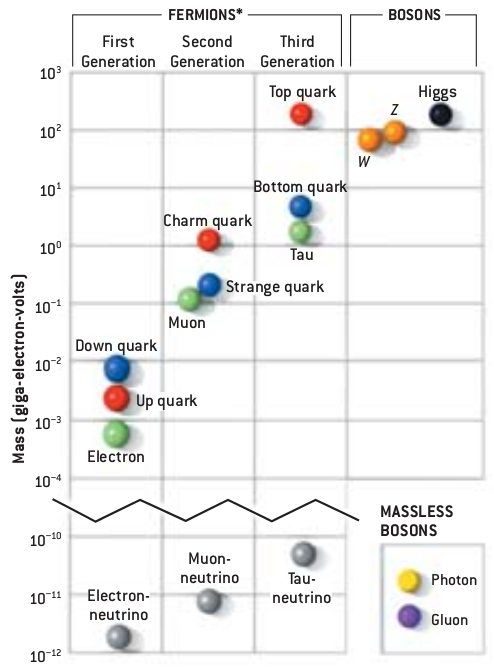 Particle masses, with the bizarre low-mass neutrinos. Image credit: Gordon Kane, Scientific American, May 2003.
Particle masses, with the bizarre low-mass neutrinos. Image credit: Gordon Kane, Scientific American, May 2003.
The mass is so low that the only neutrinos we've ever detected have so much kinetic energy relative to their masses that their speeds appear to be indistinguishable from the speed of light. We expect that they'll move slightly slower, but even from supernovae a million light years away, the "delay" in a neutrino compared to the speed of light will be less than a single second, and neutrinos themselves are emitted over a period of 10-15 seconds in such an event. Until we can detect the low-energy neutrinos arising from the Big Bang directly, rather than the indirect method we use today, we don't have any prospects for measuring neutrino speeds departing from the speed of light.
From Art Glick on Treknology: "My iPhone already does way more than Kirk’s tri-corder ever did. I defy someone to dispute this. Measure radiation? Diagnose disease? Analyze materials? It’s even a communicator, too! Kirk needed a separate communication device."
Well, Bones' tricorder did things your iPhone will never do. It's true that many of the devices envisioned by Star Trek are not only real, the real-life application of them has far surpassed what Star Trek ever envisioned. Some technologies are on their way, others are just emerging, still others feel like they're forever out of reach. You can laugh at the quaint ideas of Star Trek from 50 years ago, but how many of the things we envision today will still be pipe dreams in 50 years, and how many will be achieved and surpassed quite easily?
I don't know, myself, which ones to bet on past the next decade. But there are a few I know to bet against...
From PJ on the same topic: "If the acceleration doesn’t get you, the beer & deceleration might stand a good chance."
The problem of accelerating is a big one in Star Trek. There are no such things as inertial dampeners, and the reason is a pretty fundamental one that appears difficult to overcome: there's no such thing as a gravitational conductor. With electromagnetism, you can configure charges -- positive and negative -- in such a way that fields can cancel out in a region of space. But with gravitation, you only have one type of charge, and can't do the same thing no matter how you arrange them. Not every Treknology is going to become real, at least, not without introducing new physics from what we know to the Universe.
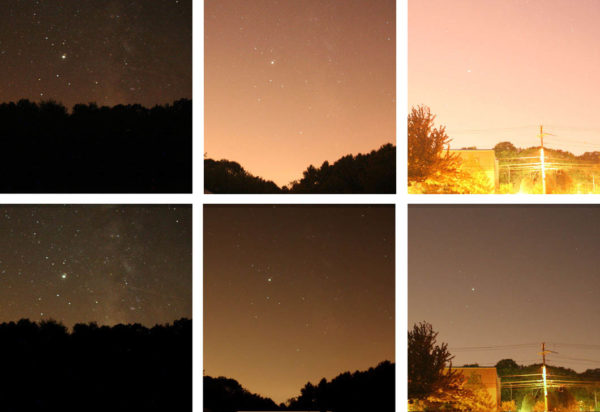 What a digital camera (top) and the human eye (bottom) sees from dark sky locations rating a 4, 6 and 9 on the Bortle scale, respectively. Image credit: Tony Flanders of Cloudy Nights, via http://www.cloudynights.com/topic/306632-illustrated-with-real-images-b….
What a digital camera (top) and the human eye (bottom) sees from dark sky locations rating a 4, 6 and 9 on the Bortle scale, respectively. Image credit: Tony Flanders of Cloudy Nights, via http://www.cloudynights.com/topic/306632-illustrated-with-real-images-b….
From eric on light pollution and the Bortle scale: "I live in the suburban eastern seaboard. This time of year we can see the constellation Orion and maybe 5-10 other stars on a good night, but that’s about it. I think that puts us at about a 8 on the scale?"
If you can only see about 20 stars, you are likely a 9 on the Bortle scale. A good test is the Big Dipper: if you can see all 7 stars, you're probably an 8. If you lose the dimmest one -- that connects the handle to the cup -- you're probably a 9. Megrez, the connector star, is a third-magnitude star, while all the others are second-magnitude. If you see fewer than six and/or can't find the North Star, you're not only a 9, you're well above the 8/9 transition. Skies are getting rougher all over the eastern United States, with no signs of letting up. Incidentally, many places in the ocean are now terrible for stargazing as well; squid fisheries can be as bad as parts of Las Vegas for light pollution.
From Omega Centauri on seeing galaxies: "From my house I never could find triangulum (with a 12inch Dob). Once I thought I found a slightly brighter patch of sky with the binocs, which was probably a detection? But, that was years back, its much worse now. Other than M-31 all galaxies are only tiny cores (the galactic nuclei tend to be bright enough). truly disappointing….."
This is the problem with light pollution: for galaxies or nebulae, objects whose brightnesses aren't concentrated into points but rather are extended, or smeared-out over the sky, the ground brightness can swamp anything that the natural sky produces quite easily. At my home college of Lewis & Clark, we have a huge (~24") telescope in an observatory. With the light pollution we have, many Messier objects -- the ~110 objects among the easiest to find -- cannot be seen at all. But from a dark sky location just perhaps 50 miles away from Portland, I can easily make out both M81 and M82 with a pair of binoculars.
They don't look like much, but if you don't see clouds without a pair of binoculars, then you see fuzzy, cloud-like objects that don't move relative to the stars over seconds or minutes, you've probably found yourself a galaxy... or two!
Artificial lights strongly overlap with the concentrations of Earth’s population, showing the locations of light pollution. Image credit: Data courtesy Marc Imhoff of NASA GSFC and Christopher Elvidge of NOAA NGDC. Image by Craig Mayhew and Robert Simmon, NASA GSFC.
From Denier on light pollution: "Here’s a global map with a light pollution overlay:
http://djlorenz.github.io/astronomy/lp2006/overlay/dark.html"
That is a cool site, but one that I only recommend if you want your information 11 years out of date. There is a modern, zoomable light pollution atlas covering the entire world here: https://www.lightpollutionmap.info/
What's most incredible if you compare the two sites is that you can clearly identify many locations where light pollution has severely worsened from 2006 to 2016. It's a quiet tragedy how we've lost our connection to the night skies, and yet it's a relatively inexpensive fix if we only had the political and economic will to make that tiny investment.
Image credit: Berkeley Earth Surface Temperature project, via http://www.berkeleyearth.org/.
From Denier on climate change: "I find interesting the dichotomy between how simulations are handled by real scientists versus how they are handled by climate “scientists”."
You are way off base here. Your interpretation of what is happening is not reflective of the actual science in any way whatsoever.
- Climate scientists are real scientists.
- Climate scientists handle data in the exact way real scientists ought to.
- If you look at the full suite of the climate science literature, you can see this for yourself.
- When you take the raw data and calibrate it yourself and do the analysis yourself, you can reproduce this.
- Teams of climate skeptics have done exactly this -- some even taking their own data from scratch -- and have repeatedly reproduced what the climate science literature says.
If you want to see how well-or-poorly simulations and models match what we actually observe, I highly recommend this simple interactive well-constructed presentation from Bloomberg. Perhaps you can now give me a lesson in how to be good about admitting when you're wrong?
This artist’s impression displays TRAPPIST-1 and its planets reflected in a surface. The potential for water on each of the worlds is also represented by the frost, water pools, and steam surrounding the scene. Image credit: NASA/R. Hurt/T. Pyle.
From Omega Centauri (and others) on the suitability of worlds around red dwarfs for habitability: "Between tidal locking, and the high stellar activity of red dwarfs, these planets may not contain favorable conditions. Didn’t Ethan largely rule out red dwarf systems as promising candidates for life a few months back?"
We make an implicit (erronous, IMO) assumption when it comes to life on alien worlds: the conditions must be like Earth in a great many ways. I have seen arguments that things need to be far enough from the galactic center, or they'd get too much cosmic radiation. That they need a gas giant just beyond the frost line, or asteroid collisions will be too many. That they need a large moon, or the axial tilt will vary too much. That they can't be tidally locked; that they can't have energetic, flaring suns; that they can't be too low in density; etc.
These arguments are mostly garbage until we actually have more data, and most of them are demonstrably wrong. There are many who argue against red dwarfs as promising, but that's only assuming all of the Earth-like conditions are necessary, which isn't a great assumption. I will have more on this not this week, but next week.
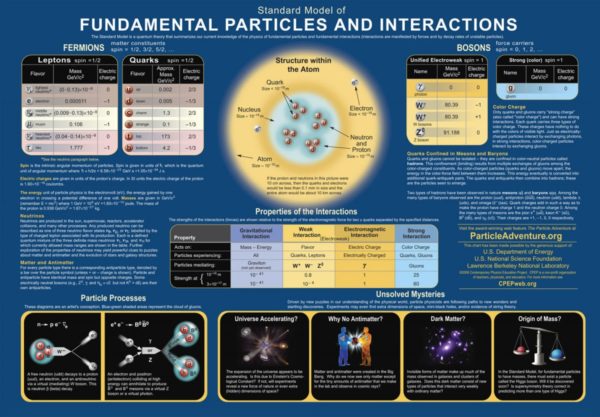 The particles and forces of the Standard Model. Image credit: Contemporary Physics Education Project / DOE / NSF / LBNL, via http://cpepweb.org/.
The particles and forces of the Standard Model. Image credit: Contemporary Physics Education Project / DOE / NSF / LBNL, via http://cpepweb.org/.
From jklsdjklsd (sic) on a question begging for a Yahoo answer: "Why photon doesn’t get submerged into Higs field…"
Because the Yukawa couplings of all massless particles to the Higgs field are identically zero.
An artistic rendition of Benjamin Franklin drawing electricity from the sky at the Philadelphia Museum of Art. Image credit: Benjamin West, c. 1816.
From CFT on science and politics: "But if you are going to make science a political entity, you are going to have to accept all that goes with it, namely, there will be ‘consensus’ driven science…"
Either you didn't comprehend what I wrote, or I didn't do a good job explaining myself over the many years I've been talking about this. There are certain truths about the Universe that are demonstrable. There are experiments you can perform, observations and measurements you can make, that will validate or invalidate scientific theories that seek to explain these. The article you link to is a contrarian piece, and contrarian pieces are allowed and even encouraged in science.
But they are not accepted without evidence. Science is a human endeavor, and so it is inherently subject to our human biases and failings. To pretend otherwise is just that: pretending. But consensus in science is only achieved when the evidence is so overwhelming that there are no outs. Ask 100 physicists for a consensus on the meaning/interpretation of quantum mechanics. Then ask for a consensus on the validity of general relativity. You'll see a big, big difference, and that difference is illustrative of when there is an isn't a scientific consensus.
From rork on Ben Franklin's lightning rod: "Ben’s own Franklin rod in his house had a small gap, with a bell that would ring when there was enough charge in the sky. The gap was small enough so that lightening could bridge the gap. Evidence mostly from a letter to his wife explaining how to make it stop making noise.
A thing I find odd, is that how the kite and other experiments actually worked, and what they showed, was never explained to me in high school or university."
I never knew the story about the rod-gap in his house because his wife wanted it to stop making noise. The second point you bring up is actually something I'm okay with: I don't think it's up to us to legislate a uniform education for everyone; I think having people know a variety of things and have different toolkits to solve problem is a very valuable thing. The one thing that should be an option is that you can always go and learn the "hows" or "whys" behind what you're interested in. The opportunity should be there; taking it can require a bit of initiative.
Various models of inflation and what they predict for the scalar (x-axis) and tensor (y-axis) fluctuations from inflation. Image credit: Planck Collaboration: P. A. R. Ade et al., 2013, A&A preprint, with additional annotations by E. Siegel.
From Sinisa Lazarek on inflation: "Couple of things to note. Science doesn’t start or end at physics, let alone just HEP and inflation. So saying scientists care about sigma… is just as wrong as saying, all people in IT care only about shift registers.
Secondly, inflation (as much as a buzzword and nice hypothesis) is nothing more than that. An idea.. which is based in science but which isn’t tested, and which might never be tested. So going with inflation might not be correct, but since inflation is not accepted as fact as is hasn’t been scientifically tested.. you can’t really use that as a strawman"
I don't really agree with your second part; inflation has made a number of predictions, and a great many of them have been verified. I've written about that multiple times -- including in my book -- but you can read about the most recent iteration of that online here, with information from 2016's AAS meeting.
The Laniakea supercluster, containing the Milky Way (red dot), on the outskirts of the Virgo Cluster (large white collection near the Milky Way). Image credit: Tully, R. B., Courtois, H., Hoffman, Y & Pomarède, D. Nature 513, 71–73 (2014).
From Frank on what existing means: "I don’t think we can really say Cosmic superclusters do not actually exist. By looking at Laniakea in the image, it clearly has a structure/order. It just does not have “gravitationally bound” property that smaller clusters have."
That's true, but what you call that property of "gravitationally bound" is what defines something as a structure or not in cosmology. If you're not bound, you're not a structure. You're an association instead. We are not part of the Virgo Cluster; quasars in the Huge-LQG are not bound together because the Huge-LQG isn't a true structure; and the components of Laniakea are not "all part of this supercluster." Because when these words like "superclusters" were coined, we didn't know about dark energy. Now that we do, this idea is worse than meaningless; it's incorrect. You can't redefine your way out of that.
Image credit: © 2015 Shaper Helix — II Demo, via http://www.alevelsolutions.com/pure-mathematics.
And finally, from Anonymous coward on some fun math: "All polynomials, even those of degree higher than four, do have full solutions. The fundamental theorem of algebra sees to that. You must mean solutions in radicals, but there really is nothing special about radicals. More general functions known as Siegel modular functions (By the way, Ethan, do you have any relation to Carl Ludwig Siegel?) and hyperelliptic integrals have been developed to express the solutions to polynomial equations of arbitrarily high degree (Thomae’s formula)."
You're not guaranteed real solutions, but you are guaranteed solutions mathematically. One of my favorite ways to illustrate the difference between physics and mathematics is to ask people what the square root of four is. They'll usually say two, and I'll ask them if they're sure. They'll often pause after that, because they think I'm trying to trick them. And I am. Because it's plus or minus two, right? So which one is the answer to my question? Which one is my square root of four? In mathematics, they both are. But in physics, we only have one Universe, and one solution, and only one of them is going to be right. Mathematics won't give you the answer; you need to apply something about the physical Universe to find which one is our solution.
And as far as I go, it is very unlikely I'm related to any of the other Siegels you know. My great grandfather, Jake, immigrated to the United States about 100-110 years ago. Back in Russia/Poland, he was Jake Pechenik. (Or maybe Pochenik, or maybe even Pieczenik; my uncle would probably know.) He took the name Siegel when the military came looking for a Pechenik to draft, and then left the country and came to America through Ellis Island. So I am a Siegel, but I don't come from a long line of Siegels. No relation to Carl, Irving, Joel or even Bugsy. But despite that, we've got a great week on tap for you coming up on Starts With A Bang, and I'll see you back here tomorrow to kick it all off!


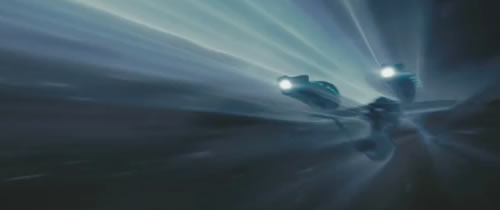
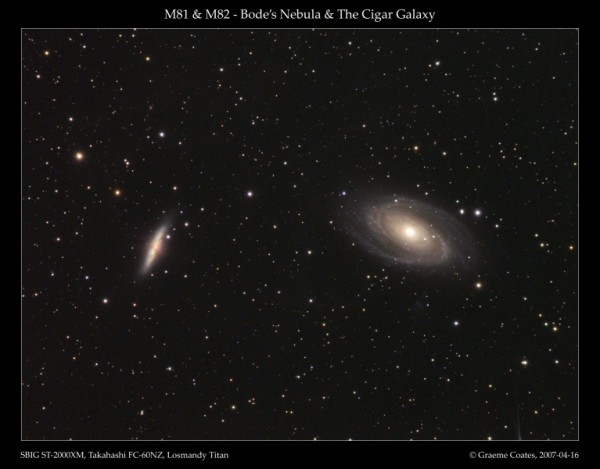
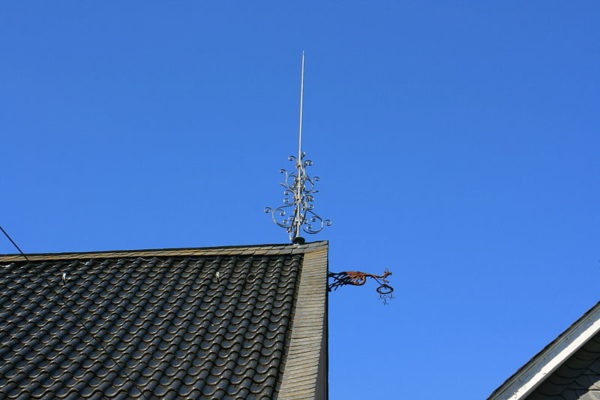
Ethan,
Thanks again.
John
It's humbling to read such articles and realize how little we understand of everything that is around us........ :)
"...ask people what the square root of four is. They’ll usually say two, and I’ll ask them if they’re sure."
Unfortunately the common convention now is to say "the square root of four is two -- apparently because saying the more correct phrase "the principal square root of four is two". So, according to common usage, saying the answer is two is typically taken as correct. (And no, many of us in math/stat are not thrilled about the loss of precision either.)
Franklin's kite experiment is not something you should try at home. I've heard that people have been killed trying it. Franklin was lucky.
@Ethan wrote:
I laughed out loud when I read this. Of course climate scientists are real scientists and I’m blatantly trolling when I say otherwise. It has ‘scientist’ right in the title. I do honestly view the average climate scientist to be of a lesser intellect than most of the hard sciences. For instance if communists took over the US and forced you to become a climate scientist I think you’d easily be able to do the job. If on the other hand they forced the average climate scientist to do quantum field theory calculations in curved timespace by hand or get a bullet in the head, there are many who I think wouldn’t make the grade.
@Ethan wrote:
This is a dangerous blanket statement and demonstrably false. The best example is one I’ve mentioned before: Keith Briffa. Briffa cherry-picked a dataset from fellow researcher Schweingruber to create a hockeystick from Schweingruber’s flat dataset. Briffa then hid the details of what he’d done for 9 years even from his colleagues. When it became clear what he had done, the CRU pulled the Briffa Yamal dataset and Briffa was essentially forced into retirement. You can find more details by searching ‘YAD061’, but the lesson is this: Climate scientists are people. I believe most are good, well-meaning professionals. That doesn’t mean all of them are. There are bad apples that do not handle data in the exact way real scientists ought to.
@Ethan wrote:
While I cannot claim that I’ve looked at the ‘full suite’, I have looked at more than the average layman. In over 95% of what is being said the science is indisputable but there are holes still considered active areas of research.
@Ethan wrote:
Funny thing that. CMIP5 highlights 61 different climate models, each modeling the climate in a unique way. There aren’t 61 different way to calculate orbital mechanics. There is only 1 if you want to do it right, or you can use Newton’s if you want a quick and dirty answer that may have a bit of error. We have that problem figured out. I may be able to reproduce some of the models but none of the models can reproduce reality. If there were a model that could, there would only be one model needed.
@Ethan wrote:
Are you familiar with the term ‘expert witness’? In court it is someone you pay to provide favorable witness testimony. They are also known as ‘defense whores’. That is exactly how I view BEST (the team I believe you are referring to). I’m not saying it can’t happen. My view is constantly evolving as I learn more but I find the way Richard Muller’s team so decisively switched sides at the exact time they changed from a right-leaning primary benefactor to a left-leaning primary benefactor to be conspiracy fuel. It would have been better if it hadn’t been so coincidental. It tarnishes their work in my eyes even though as previously mentioned I do believe humans are warming the planet.
"I don’t really agree with your second part; inflation has made a number of predictions, and a great many of them have been verified."
In a sense... yes... but in the same sense.. so did string theory. And I still don't think that ST is proven or experimentally tested, for me to say.. yes.. we have direct/indirect detection of strings and we can calculate what happens when any given string does anything
In the same sense, I don't feel we know what actually inflated. What are the properties of that "something", what made it be so dominant, do calculations on it like we do i.e. with electric field .. and so on. Are we on a good path... yes, has inflation been scrutinized in the same way as i.e. SR has... not even close IMO. I don't think inflation is wrong, I just think it's nowhere near "solid" enough as rest of the proven things in physics.
@ Denier
" I do honestly view the average climate scientist to be of a lesser intellect than most of the hard sciences. "
why?... because non-linear partial differential equations used to model weather are so EASY ??! so easy that we can't even get the exact solutions. In fact it's the same sphere of math used in GR, string theory, solid state physics, quantum mechanics .. etc...
And supercomputers, mainframes, satellites, sensors etc etc.. and everything needed to run all of that and get results every day.. so that your local weather girl can tell you weather or not it will rain.. to really about 70% accuracy... is a a task to match i.e. any particle accelerator operation.
I do agree that there is a difference between someone who studies weather and climate in a broad general sense so that he/she can work at a local TV station, and someone who studies weather/climate so he/she can build better models or make more sensitive sensors or satellites. But there is absolutely no difference between the later ones and any other physicist/engineer/mathematician working in their respective field.
" forced you to become a climate scientist I think you’d easily be able to do the job. If on the other hand they forced the average climate scientist to do quantum field theory calculations in curved timespace by hand or get a bullet in the head, there are many who I think wouldn’t make the grade."
LOL.. do you think i.e. a medical doctor would have better luck with QM?? Or do you not consider medicine to be a hard science as well. In either case... if roles had to be changed.. would you feel comfortable going under a scalpel that Ethan is holding? Surely being able to do QFT in curved spacetime gives him some credence to remove your appendix.. no?
@ Ethan
re: lineage
Being from central europe.. I'm pretty sure your great-grand father's birth name wasn't Jake. Might have been Jacob (or Jakov.. which is a local variant) or Johan.. or Janos. But Jake is a name he probably took when he came to US, as it not a native Polish or Russian name.. or any of the countries nearby.. other than UK or some scandinavian countries maybe.
" 1. Climate scientists are real scientists.
I laughed out loud when I read this."
Of course you did, because your entire sense of self is under attack when you see the reality with AGW. It just means that in this area you're just actually insane.
"t has ‘scientist’ right in the title."
And it has "scare quotes" in it because you want to infer they're not real scientists. But you're a lying sack of crap, so misrepresenting even yourself is kinda normal for you.
" 2. Climate scientists handle data in the exact way real scientists ought to.
This is a dangerous blanket statement and demonstrably false. "
The only danger is to your political sensibilities, denier.
" The best example is one I’ve mentioned before: Keith Briffa. Briffa cherry-picked a dataset from fellow researcher Schweingruber to create a hockeystick from Schweingruber’s flat dataset."
There's a whole shitload of lie there.Apparently you're trying to make the MWP disappear. Something you and your ilk continually harp on about Mann doing as something that proves malice.
Seems like you're now proving you yourself are malicious. Well done!
"When it became clear what he had done, the CRU pulled the Briffa Yamal dataset"
Nope, they tried without bristlecones and it made no difference.
" and Briffa was essentially forced into retirement."
By the hounding you denier morons made of him. He's still 100$ working, though. Ask Steyn if he's retired, fuckwit...
" 3. If you look at the full suite of the climate science literature, you can see this for yourself.
While I cannot claim that I’ve looked at the ‘full suite’, I have looked at more than the average layman"
No you haven't. you've looked at denier blogrolls and sniffed deeply of their shit.
" 4. When you take the raw data and calibrate it yourself and do the analysis yourself, you can reproduce this.
Funny thing that. CMIP5 highlights 61 different climate models, each modeling the climate in a unique way."
In the same way there are scores of different spreadsheets, all writing the spreadsheet in a unique way. Your assertion here is either a flat out lie or meaningless, denier.
" 5. Teams of climate skeptics have done exactly this — some even taking their own data from scratch — and have repeatedly reproduced what the climate science literature says.
Are you familiar with the term ‘expert witness’? "
So when you and your type lauded BEST and would 100% support its results, you knew that they were going to find against you?!!??!?!
More fake history from the denier retard.
"“I don’t really agree with your second part; inflation has made a number of predictions, and a great many of them have been verified.”
In a sense… yes… but in the same sense.. so did string theory."
I don't think string theory has made any predictions yet, they've only managed explanations of what has already been found.
So not in the same sense at all.
I thought the biggest problem with string theory is that you can't use it to make predictions because there are so many different solutions.
" or get a bullet in the head, there are many who I think wouldn’t make the grade.”
Do you want to take that challenge, denier? Will YOU make the grade or just get planted in the ground?
@Sinisa Lazarek wrote:
If you really dig in to the work you'll find those doing the heavy mathematical lifting are non-climate scientist collaborators. For those few that do 'roll their own', they often have a background beyond climate science. A good example is James Hansen who I make fun of for predicting the ocean levels will rise 10 feet by 2028. He has BAs in Physics and Mathematics and a PhD in Physics. James Hansen doesn't have any climate science degrees, but at least he can do the math.
Contrast Hansen to Climate Scientist Phil Jones, the head of the CRU. In a conversation with Bob Ward of the Grantham Research Institute, Jones admitted that he can't even plot a linear trend line on his own.
The incoming Freshman statistics posted by Cal Poly that I linked to in the other thread aren't made up. Climate Science is not drawing the best and brightest we have to offer.
@Wow wrote:
Dead. I'd be dead for sure, but I've never claimed to be a scientist.
@ Denier
don't understand really your beef with different people from different branches being in climate science. Meteorology by definition is a multi-disciplinary science. I am not that interested in anti global warming etc.. can't be involved in everything.. but from what I quickly searched on Phil Jones.. he is a hydrology engineer, not a physicist. Weather he's findings are correct or not .. I don't know. But I don't understand why in your opinion everyone needs to be a physicist for what they do to be scientifically valid? If the this Phil person was wrong somewhere or wright somewhere, has nothing to do with him being or not being a physicist, trained in all sorts of fancy math. Why? Is there some rule that says.. if he knows ultra advanced math, he surely doesn't make mistakes.. or surely he is more smarter then rest in everything he sets his mind to. That's just wrong on so many levels.
"If you really dig in to the work you’ll find those doing the heavy mathematical lifting are non-climate scientist collaborators."
Ah, right. If you get a specialist in to do some of the odd stuff, this is somehow not doing it right.... yeah... not seeing it myself.
"Dead. I’d be dead for sure, but I’ve never claimed to be a scientist."
How about hold that gun to your "wife's" head, hmm?
"If you really dig in to the work you’ll find those doing the heavy mathematical lifting are non-climate scientist collaborators. "
That is probably the farthest from a flaw in the work you could come up with. Statisticians, applied mathematicians, and more, work with people in physics and other areas all the the time. Once again, you have no substance to support your dismissal of their work -- it just comes down to the fact that you don't like what the science says, not that you have a valid objection to the work.
"Do you want to take that challenge, denier? Will YOU make the grade or just get planted in the ground?"
I will take your challenge Wowzer, ya got time for 3000 post of drivel in ya?
LMFAO!!!
"I will take your challenge"
That was denier's challenge to Ethan, fucking idiot. So, you gonna stick a gun to your head and pull the trigger if you can't do QFT by hand?
"That was denier’s challenge to Ethan, fucking idiot."
Sorry, My bad.. I was looking forward to kicking your ass up and down a thread like John has done previously.
I guess it will have to wait.
Ah, alt-facts again, moron. Sorry, you don't get to redefine reality for anyone else but yourself. It ended with it being shown Ethan agrees with me and with Richard Dawkins along with Bill Nye, all supported by direct quotes, that science can prove the existence of god.
Entirely the opposite of what you have imagined happened.
So, will you be holding a gun to your head, retard? Go on, try and then if you can't do the QFT calcs by hand, pull the trigger.
Post it on youtube.